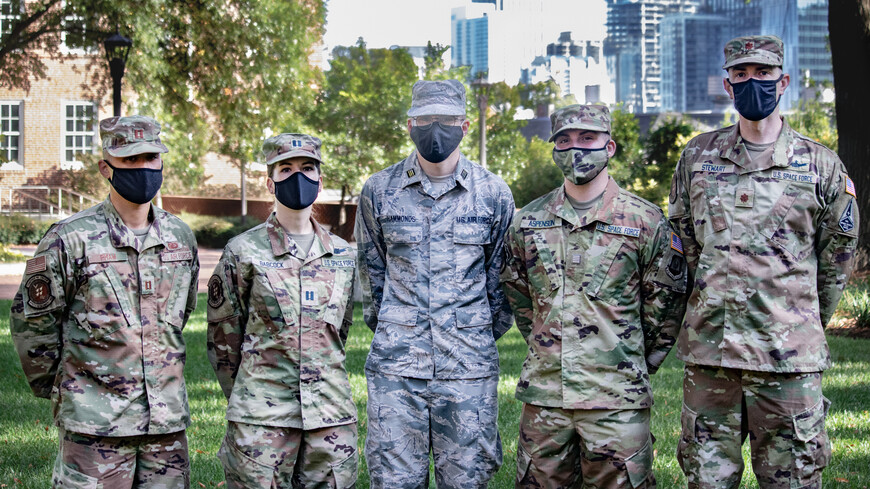By Michael Pearson
Alumnus Joshua Hammonds, ME 2020, will soon become a part of Georgia Tech history as one of the first few Georgia Tech students to become members of the U.S. Space Force.
“I’m looking forward to using the skills and education I have cultivated here to continue Georgia Tech’s legacy of outstanding service to the military and the nation," the Ellerslie native said.
When Hammonds goes on active duty to begin training as a space operations officer, he will join three officers at Georgia Tech — including one studying in the Sam Nunn School of International Affairs — who already have transferred to the nation’s newest military branch.
Capt. Chloe Babcock, an instructor Georgia Tech’s Air Force ROTC Detachment 165 and a master’s student in the H. Milton Stewart School of Industrial and Systems Engineering, was the first currently enrolled Georgia Tech graduate student to transfer to the Space Force, in September.
Major Brian Stewart, a Ph.D. student in the Nunn School , followed a month later.
One of the newest members of the ROTC detachment, Capt. Minh Pham, also recently transferred to the Space Force.
Additionally, in addition to Hammonds, two other ROTC cadets from Georgia Tech joined the Space Force after graduating. Melody Marshall Wolfson, AE 2020, and John Willingham, AE 2021, first commissioned into the Air Force after graduation, then joined the Space Force in May.
The moves are part of the Space Force’s effort to bring in all of the space operations officers, cybersecurity experts, engineers, and acquisitions officers the new service will need. Transfers are competitive, and not everyone is chosen. But cadets from Georgia Tech are in a great position, said Lt. Col. David Cumings, commander of the Air Force ROTC detachment at Georgia Tech.
“With all of the advanced technical degrees offered here, the opportunities are going to be amazing for all of these students, whether in the Space Force or the Air Force,” Cumings said.
Cumings will be in charge of training for Air Force and Space Force officer candidates at Georgia Tech and 11 other metro Atlanta colleges and universities. Space Force is a part of the Department of the Air Force.
Stewart, who received his commission from Detachment 165 in 2008 as a Kennesaw State University student, spent the first part of his career as a space operations officer responsible for operating military satellites.
After completing his doctorate in international affairs, he will transfer to the U.S. Air Force Academy as a faculty member. There, he will work to help expand the academy’s space-oriented curriculum.
What I’m really looking forward to bringing is the liberal arts education and experience that I’m getting at the Ivan Allen College, because space is not just about technological solutions and engineering our way out of problems. We also have to approach things from a broader perspective. We have to understand international relations, we have to manage perceptions and all the things we’re doing in establishing a Space Force. And Georgia Tech is kind of the perfect location for that because we do such a good job of blending liberal arts with STEM education.
– Major Brian Stewart, Nunn School Ph.D. student and Space Force member

“What I’m really looking forward to bringing is the liberal arts education and experience that I’m getting at the Ivan Allen College, because space is not just about technological solutions and engineering our way out of problems," Stewart said. "We also have to approach things from a broader perspective. We have to understand international relations, we have to manage perceptions and all the things we’re doing in establishing a Space Force. And Georgia Tech is kind of the perfect location for that because we do such a good job of blending liberal arts with STEM education.”
Hammonds said he looks at Space Force as a chance to put the skills he has learned at Georgia Tech to optimal use. He won’t directly be using his mechanical engineering degree in his work operating satellites. But he says the technical education he has received at Georgia Tech will make it easier for him to do his job well.
“As an engineering student at Georgia Tech, I’ve been trained for the past five years specifically to solve large problems. I think joining the Space Force will give me the opportunity to do that,” he said.
Hammonds will soon be joined in May by Kennesaw State University student Justin Aspenson, who will become the yet another Space Force officer after graduating from Georgia Tech’s ROTC program. He gave up a pilot slot in the Air Force for the opportunity to be among the nation’s first Space Force members.
“I saw that as something I could put on my gravestone,” he said.
The opportunity to be part of something historical also is a big part of why Pham, an acquisitions officer, joined the new service.
“I mean, how often does a new military branch get stood up?” he said.
Georgia Tech has a long military tradition, including more than 100 years of ROTC. Four Georgia Tech students have received the Medal of Honor. The school also has produced numerous military leaders over the years. They include figures from history such as Army Chief of Staff Gen. Leonard Wood and Marine Corps Assistant Commandant and Korean War hero Gen. Ray Davis. More recent figures include Air Force Gen. Phillip Breedlove, who commanded NATO, and Navy Adm. Sandy Winnefeld, who retired in 2015 as the nation’s No. 2 military official.
Winnefeld and Breedlove are now distinguished professors in the Nunn School.
The Nunn School and Georgia Tech’s ROTC programs are units of the Georgia Tech Ivan Allen College of Liberal Arts.

